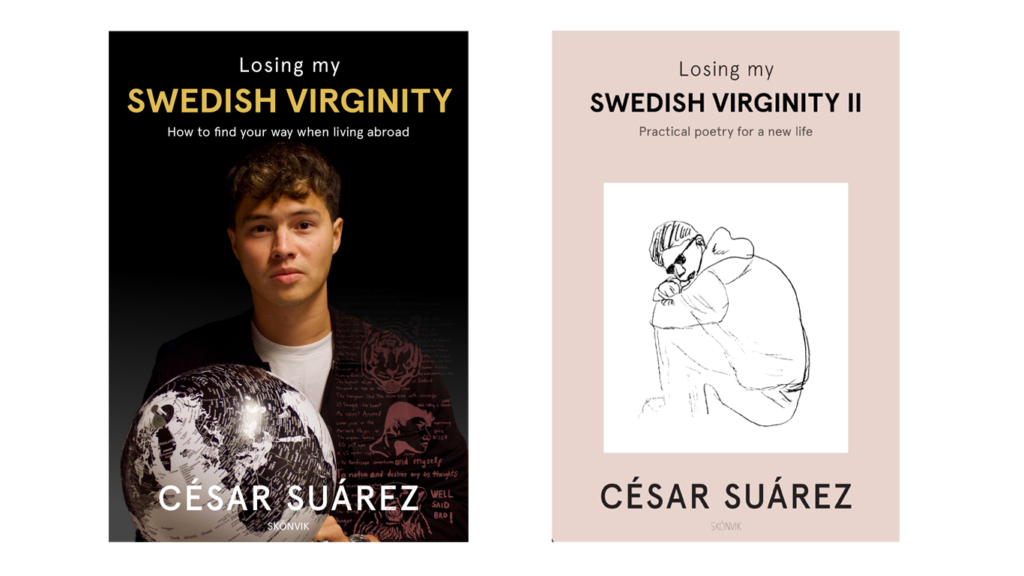Colombian international student’s, César Suárez, book suite Losing my Swedish Virginity I & II is a love child of Jordan B Peterson and Donald Trump and the product of a “Just do it” entrepreneurial spirit. Maybe someone should have told him “Just don’t”.
“To my fellow men around the world between 18 and 35 years old. We are responsible for running the world these days. We need to become better men. We need to save the world. We need to save us.”
Thus, begins the first half of César Suárez’, a Colombian-born international master student from the Department of Economic History at Lund University cum tech entrepreneur, self-published book series Losing my Swedish Virginity. The first part of the book suite, How to find your way when living abroad, reads like a self-help guide on how to become a better, more successful, more desirable man, and includes chapters like: “Quitting news gets you more time”, “Food and common sense are more effective than medicine” and the all-encompassing “Business, education and women”.
Contrary to what the title might suggest, the book offers precious little insight on what it’s like to be a legal alien in Lund. Instead, it is little more than the love child of Jordan B. Peterson, Neil Strauss (author of The Game) and Donald Trump; namely a “how to” on toxic masculinity. Or in the words of the author himself: “The goal of this book is to give the structure to a life that allows a person to have a healthy mind and body, to get and maintain good friendships, to discover new business opportunities, and of course, to date a good woman … Nothing mentioned here is out of reach for most of the people. However, it is written for men that have decided to level up.”
If this paragraph from the back of the book doesn’t define the target audience enough, let’s make it clear: Men only. Heterosexual men, that is. I imagine feminists would have a field day reading this book. With paragraphs like “Actually, if I could, I would only date girls that go to the gym. They do the best positions. They can do reverse cowboy with their feet on the ground and do those squats with high frequency and power (just like the doctor told you!” or the poem “I’m feeling like an expert / And I’m going to say it with confidence / I will never, ever, get tired / Of making love to beautiful girls” I picture César Suárez’s face as a dartboard pierced by an arrow on any female readers’ wall.
Sadly, attempts by the author to be politically correct only seem to backfire. “People are racists, so are you probably, even if you have not noticed it. When you went to the doctor and you said: ‘oh that doctor is a black man, he must have been very lucky’. That is racism. You cure your racism by understanding that the value of people doesn’t come from their skin color. We live here in this moment. We are alive. We breathe, we can feel our hands, our heads, our legs, and our dicks.”
However, the author doesn’t seem to lack confidence. ”I am writing it (the book, editor’s note) before I get famous or I get to an income level in which money doesn’t matter anymore. Before my mind gets even more intoxicated, and I get dumb. I am a humble man.” Actually, the author is very quotable. I just wish he’d started a Twitter account instead of writing a whole book. Too bad the book includes a whole chapter on why you should quit social media, “Social Media Is A Trap”. However, this doesn’t seem to apply to the author himself, as the book ends with a shoutout to follow his Instagram account, with over 900 followers.
The author claims to be inspired by authors like Charles Bukowski and James Joyce, which might seem pretentious – but he is not far off. Actually, he has adapted Joyce’s favoured “stream of consciousness” writing method. Take for example this excerpt from the first page: “I am living mostly good days in Sweden. Yesterday was one of the good ones. I played football in the morning. We won 10-9, and I scored 9 goals and assisted one. Afterwards, I had lunch with the boys at a very tasty Gambian restaurant in Lund. I was very tired but I took a cold shower, got myself ready and went to a co-working space where I work every day, including the weekends (so nice to have the office all to yourself.” Of the 140 pages, probably one third would have been enough. As a matter of fact, bullet points would have sufficed. At the very least an editor’s guiding hand, and red pen.
The book of poems, Practical poetry for a new life, is my favorite of the two. The title might suggest the content is philosophical, which it is, but not in the way you might think. Instead, it poses the existential question of whether a book of poems is actually a book full of poems or just evenly spaced words on a page. “I want to be free / Like peeing in the forest / Or a pee at the bar / Great freedom vibes. But every now and then something sparkles, like in the poem It’s 2020, where the author writes about his friends lack of interest for his poetry: ”I get pissed of / They don’t read what I write / I wish I could feel / A bit more support // I’m also like that / I’m to lazy to spend my time / On other’s people stuff / It seems we only like stranger’s stuff.”
Another claimed inspiration is the Canadian poet and singer-writer, Leonard Cohen. This kinship isn’t visible in the lyrical qualities, yet one of Cohen’s most famous lines; There’s a crack in everything / That’s where the light gets in, is applicable to César Suárez’s poems, as they only get interesting once we get a glimpse of what is hiding under the macho surface.
Like in the poem He Knows: “Cesar knows he can / He just doesn’t know how / He can get lucky / He risks his life // He dresses well / He goes to the gym / He suffers sometimes / Because he wants to look tall // He found something inside / But he still looks for more outside / Money, fame, pleasure and friends / He knows well why he lied.”
Having finished the book series after a reluctant start, I can’t help but feel a little infected by the authors positive mind-set, naked honesty and complete disregard for ”humble” bragging. Almost as if his Swedish virginity was still intact. Also, I’m sure his tips on meditation can help some men step out of their comfort zone. Actually, maybe I’m a little jealous by the author’s accomplishment, having written two books while studying for a master’s degree and running a tech start-up in a foreign country.
His tech experience in mind, though, I just wished he would have considered publishing them as eBooks. It would have saved precious trees.










